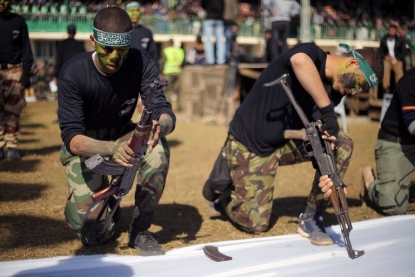At the Hamas youth camp
GAZA CITY, February 24, 2015 - We’ve been given a meeting point at the Yarmuk stadium in Gaza. My colleagues and I are here to watch thousands of youths ‘graduate’ from a training camp run by Hamas’s armed wing, the Ezzedine al-Qassam Brigades.
Each year since taking power in Gaza in 2007, the Islamist movement has staged “summer camps” for boys aged 14 to 21 in the Palestinian enclave, dispensing religious education and combat training with the aim of “resisting” sworn enemy Israel.
But with swathes of Gaza in ruins following last year’s 50-day war with Israel, a record 17,000 youths enrolled for a week-long camp in January, overseen for the first time by Qassam militants.
 A graduation ceremony for a Hamas-run youth training camp on January 29, 2015 in Gaza City (AFP Photo / Mohammed Abed)
A graduation ceremony for a Hamas-run youth training camp on January 29, 2015 in Gaza City (AFP Photo / Mohammed Abed)Out with the mid-week visits to Gaza's zoo: the Qassam-run camp featured intensive training in using light and heavy weaponry, as well as ambush techniques, according to the Brigades’ website.
Hamas says teaching youths to fight is part of legitimate "resistance" to Israel’s occupation of Palestinian territory. Rights activists, meanwhile, accuse it of exploiting children scarred by war, and see the rising militarisation of Gaza’s young as a dangerous new trend.
We are not able to witness the actual training sessions, but Hamas lets us attend the camp ‘graduation’ ceremonies.
 A graduation ceremony for a Hamas-run youth training camp on January 29, 2015 in Gaza City (AFP Photo / Mohammed Abed)
A graduation ceremony for a Hamas-run youth training camp on January 29, 2015 in Gaza City (AFP Photo / Mohammed Abed)We speak to Hamas on a regular basis – their spokesmen are always available and their leaders open to interviews. But it’s another story with Qassam – which like Hamas is considered a terrorist organisation by the European Union and the United States, among others. They have only one spokesman, who only appears on Hamas television, his face masked, to read statements. We can’t reach them.
Both Hamas and Qassam have warned us no one will be allowed in without full accreditation, which we sought out well beforehand. On the day itself, the stadium neighbourhood is in lockdown. I am stopped several streets away for an ID check by Hamas police, who issue the pass I need to report for my story.
 A graduation ceremony for a Hamas-run youth training camp on January 29, 2015 in Gaza City (AFP Photo / Mohammed Abed)
A graduation ceremony for a Hamas-run youth training camp on January 29, 2015 in Gaza City (AFP Photo / Mohammed Abed)The ceremonies are split between two sites – I attend the one in Gaza City, while another is taking place simultaneously in Khan Yunis, in the south of the Gaza Strip. At the stadium entrance, more Hamas police checks – and I am in.
To reach the training centre I walk down between two long lines of Qassam fighters, dozens of masked figures to my left and right. The mood is tense, although I struggle not to smile when I hear - just behind me - one of the fighters teasing a comrade: “Just you wait, she’s going to want to interview you.” His mate slaps him down – clearly in no mood for joking: “Be quiet! May Allah forgive you! I never speak to women. ”
 Youths show their weapons handling skills at a graduation ceremony for a Hamas-run training camp on January 29, 2015 in the southern Gaza Strip (AFP Photo / Said Khatib)
Youths show their weapons handling skills at a graduation ceremony for a Hamas-run training camp on January 29, 2015 in the southern Gaza Strip (AFP Photo / Said Khatib)I reach the designated press area, opposite the seats occupied by Hamas and Qassam top brass, among them the former Gaza premier Ismail Haniyeh. The stalls around us are largely empty - barely a few hundred families come to cheer on their children.
Before us the first youths march out in a military-style parade, led by Qassam fighters. Then suddenly the stadium is swarming with teenagers and young men, thrusting out their chests with pride at having rubbed shoulders with the highly-trained Qassam fighters.
They are here to show off their newly-minted skills and compete with one another – who will be quickest to take apart and reassemble their weapon? Qassam fighters set fire to hoops for them to jump through. I glance around the arena: not an ambulance or firefighter in sight. Throughout the ceremony, I saw no evidence of any emergency or accident planning…
 Youths jump through a ring of fire at a graduation ceremony for a Hamas-run training camp on January 29, 2015 in the southern Gaza Strip (AFP Photo / Said Khatib)
Youths jump through a ring of fire at a graduation ceremony for a Hamas-run training camp on January 29, 2015 in the southern Gaza Strip (AFP Photo / Said Khatib)As the youths leap one by one through the flaming circles, I move away from the press area to try to talk to some of the teens and their trainers. I am flanked by a Hamas press officer – who has given me his blessing – but we are still stopped in our tracks by a Qassam fighter.
“Interviews are forbidden,” he tells us sternly. Hard to stomach, when there is a cameraman busy conducting an interview just behind us. There is no changing his mind, but I head for another part of the stadium and soon find a group of youths ready to talk - at great length - about why they are here.
 A graduation ceremony for a Hamas-run training camp on January 29, 2015 in Gaza City (AFP Photo / Mohammed Abed)
A graduation ceremony for a Hamas-run training camp on January 29, 2015 in Gaza City (AFP Photo / Mohammed Abed)"The Israelis killed my niece last summer. Now I want to kill them," 14-year-old Hatem tells me. “I was afraid during the war,” admits his fellow trainee, 15-year-old Mohammed Abu Harbid, “and that is why I chose to join the resistance. Those in the resistance are never afraid.”
Kids like these have already lived through three wars with Israel, the latest of which left some 500 children dead, according to UN figures. The Qassam Brigades have warned that without reconstruction of parts of Gaza destroyed in the fighting, “there will be an explosion.” When the next flare-up comes - which none here doubt it will - its young trainees are adamant they will be ready to fight.
Mai Yaghi is an AFP reporter in the Gaza Strip
 A graduation ceremony for a Hamas-run youth camp on January 29, 2015 in the southern Gaza Strip (AFP Photo / Said Khatib)
A graduation ceremony for a Hamas-run youth camp on January 29, 2015 in the southern Gaza Strip (AFP Photo / Said Khatib)

